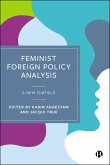The Women, Peace, and Security (WPS) agenda is celebrated as a landmark global framework for achieving gender equality in peace and security governance. Its power is visible in two decades of United Nations resolutions, national action plans, regional initiatives, and countless activist, academic, and philanthropic projects. Yet despite this vitality, it is haunted by failure, as a lack of political will and stubborn patriarchal resistance frustrate its promise.
This book offers a groundbreaking critical account of the WPS agenda, exploring its evolution in relation to the wider politics of global governance and feminism. Paul Kirby and Laura J. Shepherd argue that WPS is not a settled, cohesive policy but a field in flux, defined and disrupted by a growing number of national, supranational, subnational, and transnational agents who in turn act on an expanding catalogue of threats, from climate change to homophobia, challenging traditional boundaries of peace and security. Kirby and Shepherd reconceptualize WPS as a "policy ecosystem," tracing interaction and contestation around the agenda across levels from the UN Security Council to military alliances to feminist activists. They combine analysis of a vast dataset of policy documents with key informant interviews and close readings of diplomacy, statecraft, the politics of indigeneity, counterinsurgency, antimilitarism, human rights, and the arms trade across the first twenty years of WPS. Far-reaching and incisive, Governing the Feminist Peace poses a provocative question: What if we abandoned the idea of the WPS agenda as a unified political project altogether?
This book offers a groundbreaking critical account of the WPS agenda, exploring its evolution in relation to the wider politics of global governance and feminism. Paul Kirby and Laura J. Shepherd argue that WPS is not a settled, cohesive policy but a field in flux, defined and disrupted by a growing number of national, supranational, subnational, and transnational agents who in turn act on an expanding catalogue of threats, from climate change to homophobia, challenging traditional boundaries of peace and security. Kirby and Shepherd reconceptualize WPS as a "policy ecosystem," tracing interaction and contestation around the agenda across levels from the UN Security Council to military alliances to feminist activists. They combine analysis of a vast dataset of policy documents with key informant interviews and close readings of diplomacy, statecraft, the politics of indigeneity, counterinsurgency, antimilitarism, human rights, and the arms trade across the first twenty years of WPS. Far-reaching and incisive, Governing the Feminist Peace poses a provocative question: What if we abandoned the idea of the WPS agenda as a unified political project altogether?
Dieser Download kann aus rechtlichen Gründen nur mit Rechnungsadresse in A, D ausgeliefert werden.









